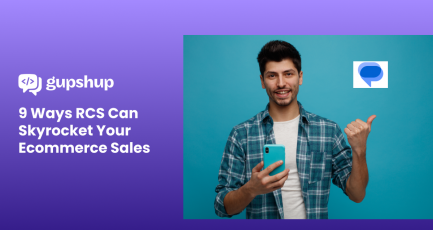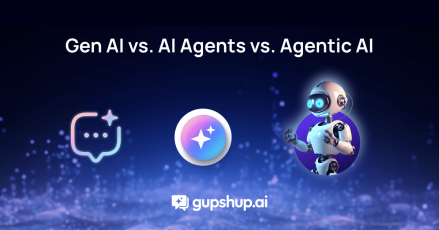Choosing the Right Type of Chatbot for Your Business Needs

Why Should Your Business Consider a Chatbot?
Did you know that by 2027, chatbot has been predicted to become the primary source of customer engagement service?
Chatbots have come a long way; from simple text replies to almost human-like conversations. No longer are they the clunky, scripted responders of the past; today’s chatbots engage in intelligent, intuitive, proactive, and personalized conversations.
But with this incredible evolution comes a crucial question for businesses: which chatbot is right for ‘you’?
The landscape of AI-powered customer support is vast and varied, ranging from simple text-based bots to advanced voice-activated systems, each with its strengths and weaknesses. Some rigidly adhere to pre-programmed scripts, while others learn and adapt, personalizing each interaction.
Businesses everywhere are captivated by its potential—increased efficiency, reduced costs, and happier customers. In the sea of customer support automation, there is no end to the classifications of chatbots. However, navigating the diverse world of chatbot options can be daunting.
In this blog, we will talk about how different types of chatbots are becoming essential for today’s businesses and which chatbot type will suffice for your business needs.
Classification of Chatbots

If you are a modern business owner, you must have known how useful AI-driven virtual assistants are. They are single-handedly changing the face of customer engagement and query handling in this digital world.
However, there are plenty of chatbots available in the market. Now is your time to understand which types of chatbots suit your specific needs and choose them from the queue. Below, we listed all sorts of chatbots valuable in businesses and how they function:
1. Rule-based chatbots
These chatbots follow predefined rules. They are perfect for answering basic FAQs or guiding users through fixed workflows like appointment bookings.Think of them as guided scripts. They work on an ‘if this, then that’ principle. For example, a customer asks about store hours, and the bot pulls the info from a fixed database. However, it cannot handle questions outside its rules.
2. AI-powered chatbots
These bots are intelligent. They use machine learning and NLP (Natural Language Processing) to understand and respond to complex questions.
They get smarter with time, learning from each interaction. Gartner says an AI chatbot can handle almost 75% of customer queries and interactions, without any hindrance. These machine-learning chatbots are best for businesses needing a personalized touch, like e-commerce or customer support. For example, if a customer says, ‘I want a red shirt,’ an AI-powered chatbot can process this, find options, and make recommendations.
3. Hybrid chatbots
Hybrid chatbots combine the ability to answer common queries with the smart senses to detect customer intentions. They blend rule-based systems with AI. They are ideal for businesses looking to balance efficiency with flexibility.
For example, a customer starts with an FAQ query. If it is simple, the hybrid chatbot quickly provides the answer. But suppose the customer follows up with a complex query. In that case, the chatbot seamlessly switches to AI mode to understand the nuance or escalates the conversation to a human agent for precise assistance.
4. Voice-activated chatbots
The voice bots work through voice commands, like virtual assistants. They are useful for hands-free environments like driving or multitasking at work, especially in the automotive, healthcare, or logistics industries.
For example, the chatbot connects the call if a customer commands ‘Call the customer service team’.
Comparison table: Types of chatbots at a glance:

Technology behind chatbots
Each type of chatbot has its strengths. The key is to pick the one that fits your business goals.
Want simple automation? Go rule-based.
Need a human touch? AI-powered is your friend.
Hybrid bots? They are the all-rounders. Voice bots? Great for hands-free solutions.
Let us peek into the technologies behind these chatbots that make them more humane:
1. Natural Language Processing (NLP)
This innovation helps chatbots understand what customers imply. NLP makes bots conversational and context-aware. For instance, a bot can decipher if ‘I need help’ means technical support or general information.
2. Machine learning
Chatbots improve by learning from past interactions. This ensures bots perform better over time. If a user keeps asking about delivery delays, the AI-driven chatbot learns to prioritize such responses.
3. Conversational AI Models
Conversational AI and generative models (like LLMs) help in creating responses on the spot. For example, a chatbot suggests personalized birthday gifts by connecting to a CRM system with customer preferences.
4. Voice recognition and synthesis
This technology enables bots to recognize voice commands and respond naturally. With this, your voice bot greets customers by name when they call.
5. Integration across multiple channels
AI-powered chatbots are not just for websites anymore. They can operate on WhatsApp, social media, and even in your ERP systems. Think of a chatbot replying to Instagram queries, managing orders on your website, and syncing with your internal software for inventory updates- all seamlessly.
A Practical Guide on Using Chatbots Across Industries
As confusing as all types of chatbots and the technologies behind them sound, their uselessness across industries is irreplaceable. The global chatbot market is rising so fast that it is expected to hit 15.5 billion by 2028.
You might already excel at running your business efficiently, but you can scale up your customer service, streamline operations, or offer personalized experiences just in one click with AI-powered chatbots. They work round the clock, are always ready to assist, and bring immense value across industries. Let us break down how you can work with chatbots for your business:
Customer support automation in retail
Chatbots shine in customer support. They do not take breaks, get tired, or miss questions. They also handle high traffic without delays, no matter the time.
Customer support automation is regulated and needed in every industry. With chatbots for your business, you can instantly solve queries, answer complex FAQs, and engage your customers with a problem-solving approach.
Virtual assistant in e-commerce
A well-designed chatbot not only improves service; it also boosts sales. In e-commerce, chatbots act as expert sales assistants. They help customers make decisions and solve problems quickly.
- Product recommendations: The Conversational AI chatbots can easily recognize the tonality and intention of your customers and answer their queries accordingly
- Order tracking: In e-commerce, it is all about providing your customers with timely post-purchase support and updates. AI-powered chatbots can easily do that.
- After-sales support: Even after the sale, chatbots help with returns or gather feedback to improve their service.

Secure and reliable patient-care assistant
In healthcare, AI-powered chatbots simplify processes for both patients and providers. It can schedule your patient’s slots for appointments without calling or waiting. Moreover, it can send reminders and alerts and track symptoms or medication schedules.
Think of it as a healthcare assistant that ensures no appointment is missed and patients stay engaged.
Student navigation in edtech
In the education sector, AI-driven chatbots work as virtual tutors for students. They help in the course navigation, step-by-step explanations, administrational FAQs, interactive learning, and more.

Personalized customer experiences in banking
The finance sector is all about trust and security. Chatbots can help with fraud detection, and account management, and even guide your customers with financial advice. They act like virtual bankers, delivering secure and personalized services in seconds.

Personal travel buddy in hospitality
The hospitality sector works best when the customers are informed, well-managed, and feel secure. An AI-powered chatbot amplifies this seamless customer experience with booking assistance, itinerary management, and solving customer queries 24/7 from planning to execution. For travel businesses, chatbots ensure happier customers and faster processes.

Chatbots for Self-Service Support
 Running a successful business means keeping customers happy. Self-service chatbots help customers find answers to their questions without needing to call or email. They are fast, efficient, and always available.
Running a successful business means keeping customers happy. Self-service chatbots help customers find answers to their questions without needing to call or email. They are fast, efficient, and always available.
The biggest benefit of self-service chatbots is they make the customer feel like they are in control. This is why, Salesforce reported in a survey that 65% of their customers have used self-service portals.
- Knowledge base integration: While training a chatbot, you definitely feed them with all your company’s information such as most-asked questions policies, product details, and more. If your information updates, the self-service chatbot learns the new details automatically. With the right setup, your chatbot becomes a talking, speaking (or typing) version of your company’s expertise.
- Reduced wait times: If you are into customer service automation, you will know that all customers collectively hate the call-waiting times the most. But with your self-service chatbot reducing the process and waiting times, now your customers do not have to hold anymore.
- User-friendly interfaces: Self-service chatbots are designed to be easy to use, even for people who are not tech-savvy. Your elderly customers can randomly type questions ‘How to reset password?’ and the machine-learning chatbot understands and guides them step-by-step. Some bots even have clickable menus for common requests, making navigation effortless.
Concluding Thoughts
As technology keeps improving, chatbots are getting smarter every day. With advancements in AI and NLP, they are only getting better at understanding and helping users.
If you are thinking about adding a chatbot to your business, it is important to choose the right solution. As a reliable solution, choose Gupshup. We make creating and deploying chatbots easy, even if you are not tech-savvy. With our user-friendly platform and powerful features, you can build chatbots that fit your exact needs.
Whether you want to simplify customer support, increase customer engagement, or streamline your operations, Gupshup has got you covered. With just a few clicks, you can start having smarter conversations with your customers and take your business to the next level. Connect with us today!
FAQ’s
1. Can AI-powered chatbots send proactive messages?
Yes, chatbots can send proactive notifications like order updates, promotional offers, or reminders to engage customers effectively.
2. How do AI-driven chatbots ensure better customer retention?
Chatbots provide instant support, personalized offers, and quick resolutions, enhancing customer satisfaction and loyalty over time.
3. How do chatbots handle sensitive customer data?
Chatbots adhere to data protection protocols and encrypt sensitive information. It can comply with regulations like GDPR for secure transactions.
Explore how chatbots for your Business can be enhanced with these insightful resources:







